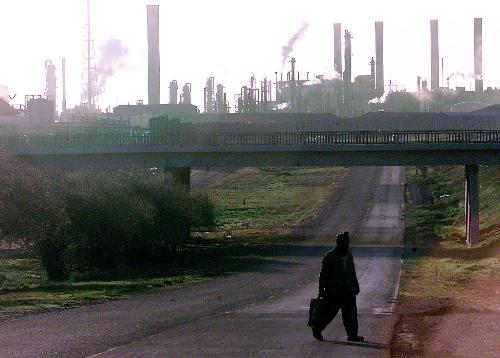
News
Pro-Palestine Encampment Represents First Major Test for Harvard President Alan Garber

News
Israeli PM Benjamin Netanyahu Condemns Antisemitism at U.S. Colleges Amid Encampment at Harvard

News
‘A Joke’: Nikole Hannah-Jones Says Harvard Should Spend More on Legacy of Slavery Initiative

News
Massachusetts ACLU Demands Harvard Reinstate PSC in Letter

News
LIVE UPDATES: Pro-Palestine Protesters Begin Encampment in Harvard Yard
Environmental Science and Public Policy
The Earth Is Screwed

Contrary to popular belief, Republicans and granola eaters can inhabit the same room without starting WWIII. Environmental Science and Public Policy, one of Harvard’s youngest and most well-endowed concentrations, is home to an interesting mix of environmental do-gooders, overachievers betting on a niche concentrations as an “in” to law school, and science-y types who prefer a little politics with their water. To quote a student, “it’s interesting having classes that mix patchouli eco-heads and Burberry collar-poppers.”
ESPP (the syllabic friendly nickname) resides in the Harvard University Center for the Environment, located in the Natural History Museum. Some question the flat screen TV placed in a hallway, others wonder at the once-open-air 3-story footbridge entrance to the Center—but all agree, the free cookies and tea (organic, of course) make this small concentration a home, of sorts.
ESPP comes with a hefty workload—17 courses, including a thesis, if you’re an honors concentrator, and a full 16 for non-honors students. Requirements are spread over a variety of subjects, including politics, economics, chemistry, and math.
Since ESPP is relatively new, it has only a few actual concentration courses. All concentrators are required to take ESPP10, “Introduction to Environmental Science and Public Policy,” which features rotating lecturers and case study approaches to five large environmental problems. Some students enjoy the haphazard approach, although many complain that there seems to be no core knowledge that is learned in the class.
The only other required departmental course, after junior tutorial and senior thesis seminars, is ESPP 78, “Environmental Politics,” taught by Sheila Jasanoff. However, while ESPP does not have many departmental courses, students in the concentration have found that courses such as EPS 7, “Introduction to Geological Science,” sand Economics 1661, “Environmental Economics,” tend to be tailored specifically for ESPP concentrators.
Although the concentration boasts an impressive variety of faculty members on its degree-granting committee, the department’s inconvenient truth is that advising is negligible at best and that a significant effort has to be made to get attention from anyone in the department. The head of ESPP is Pfoho Housmaster Jim McCarthy, study break enforcer and science advisor to Al Gore’s own Inconvenient Truth. Other professors include Paul Hoffman and Daniel Schrag, the two leading proponents of the “Snowball Earth” hypothesis, which proposes that an ice age that took place in the Neoproterozoic was so severe that the Earth’s oceans froze over completely. According to some, it could happen again. And ESPPers are the only ones who will be equipped to stop it!
And if it isn’t enough that ESPP concentrators can stop a new ice age or rub elbows with Al Gore when he comes to visit ESPP 10 (it happened in 2004), they may also get a surprise trip to Madagascar. Professor Glenn Adelson, the recipient of two Levenson Teaching awards, takes his junior tutorial, “Conservation, Nature, and Biodiversity,” to a different tropical locale each spring. Last year, students were treated to such an African adventure.
The one major complaint with ESPP is that students are often forced to shuffle between other departments for their classes. Some call the organic chemistry requirement a version of “pre-med lite”, and though some defensively say they “don’t mind pushing around those damn carbon atoms,” it is almost universally loathed. Others complain about the number of intro level science courses that the concentration requires.
But hey—you have to see the opportunity in taking freshman-dominated courses for not one but three years. Ec 10 and Life Science 1a, anyone?
Want to keep up with breaking news? Subscribe to our email newsletter.
